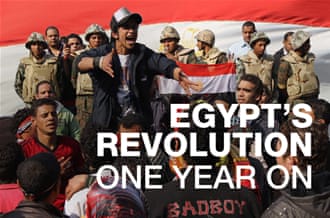Hundreds of thousands of people have gathered in Cairo's Tahrir Square to commemorate the first anniversary of the Egyptian revolution that toppled their long-time ruler, Hosni Mubarak.
It is a year since Egyptians, inspired by an uprising in Tunisia, took to the streets to call for reform and to demand the resignation of Mubarak, Egypt's president for 30 years.
"Down with military rule" and "Revolution until victory, revolution in all of Egypt's streets" were chanted by one group of mainly youths in an area of Tahrir on Wednesday.
Sherine Tadros, reporting from Tahrir Square, said: "For a section of people demonstrating here, it's really just about military hijacking the revolution, and about Islamist parties and movements now making the gains instead of those who actually initiated the revolution."
"But others say it is a rocky transition but it is still a transition pointing out to the fact that Egypt had first free and fair elections in decades and people’s assembly which reflects will of the people."
Meanwhile, about 3,000 people, who were pardoned by the military rulers coinciding with the anniversary, have walked out of Tora prison located on the outskirts of Cairo.
In an apparent attempt to appease reformist demands, the military council has in recent days pardoned people convicted in military courts since Mubarak was toppled.
The military, which was handed power as the president stepped down on February 11, has planned mass celebrations with a naval parade in the Mediterranean city of Alexandria, air shows in Cairo and fireworks displays around the country.
The ruling military council is also issuing commemorative coins for the occasion and is expected to honour public servants.
 |
It has called on Egyptians to "preserve the spirit of January 25, which united the Egyptian people, men and women, young and old, Muslims and Christians".
Al Jazeera's Tadros said: "What we have right now is their [military] promise. And this was something reiterated by Field Marshal Tantawi on Tuesday."
"Apart from saying that the scope of emergency law would be narrowed, he also said and promised, come July when there is new president in power the military will go back to barracks.
"But the big question is what will be their legacy? What kind of role they want to carve out for themselves? What kind of backroom deal they could have made with the largest force in the parliament [Muslim Brotherhood] so is to guarantee their immunity."
'Objectives of the revolution'
Activists say the revolution has been hijacked by Hussein Tantawi, for two decades Mubarak's defence minister, who now heads the military council.
Wael Khalil, Egyptian blogger and activist, told Al Jazeera: "Definitely, the revolution has not achieved its goal and that’s why the main slogan now on the street is, people going back to Tahrir Square, because the revolution continues until it realises its goal."
"Everything that has been achieved in the past one year was a result of people’s protests and demands.
"The trial of Mubarak, free elections, participation of people in the elections and other demands were not achieved by power from above, not by SCAF, but people pressuring from below."
Prominent novelist and pro-democracy activist Alaa al-Aswani wrote in the independent daily al-Masry al-Youm: "We must take to the streets on Wednesday, not to celebrate a revolution which has not achieved its goals, but to demonstrate peacefully our determination to achieve the objectives of the revolution."
These goals remain to "live in dignity, bring about justice, try the killers of the martyrs and achieve a minimum social justice", he wrote.
Dalia Mogahed, director and senior analyst at the Abu Dhabi Gallup Center, told Al Jazeera "Egyptians are more optimistic about their future than they have been in a very a long time".
According to research done by her group, Mogahed said most Egyptians believe things are getting better and will get better in the future. She said the vast majority of Egyptians still have faith in the military and the Supreme Council of Armed Forces (SCAF).
She said Tahrir Square was an important component of the story, but not the entire story. Research shows that more than 85 per cent of Egyptians say they still have confidence in the SCAF.
Partial lifting of emergency
Protesters want Tantawi and the other ruling generals to step down immediately and to stay out of the drafting of the country's new constitution, for fear they may enshrine military powers into the charter.
The military has pledged to cede power to civilian rule when a president is elected by June.
 |
On Tuesday, it announced a partial lifting of a state of emergency, but kept a clause saying emergency laws in place since 1981 would still apply to cases falling into the vague category of "thuggery".
The Muslim Brotherhood, which won the most seats in recent parliamentary elections, has announced it will join the celebrations on Wednesday, without calling for "a second revolution" or demanding that the military give up power.
"The formation of the parliament is the biggest celebration of the anniversary of the revolution," the group said on its website, a day after the lower house convened for the first time since it was dissolved after the uprising.
Leading Muslim Brotherhood member Saad al-Katatni was elected speaker of parliament on Monday, in scenes unthinkable just a year ago when the group was still banned.
Mubarak will spend the anniversary in a Cairo military hospital, where he is in custody accused of involvement in the killing of protesters during the uprising that toppled him.



No comments:
Post a Comment